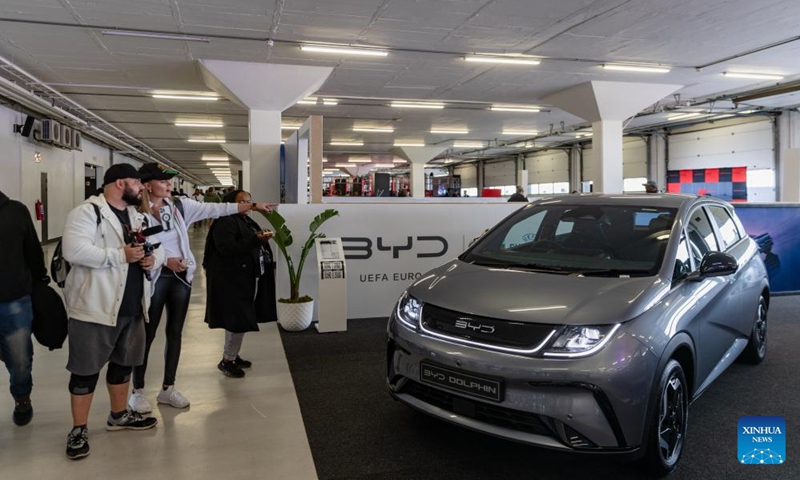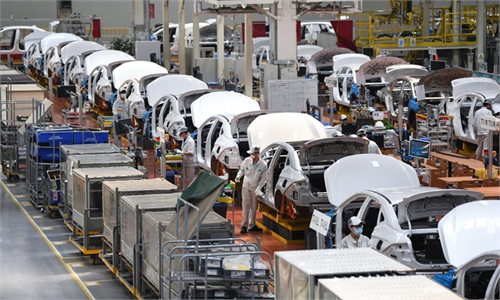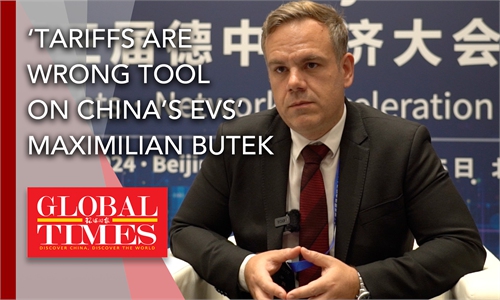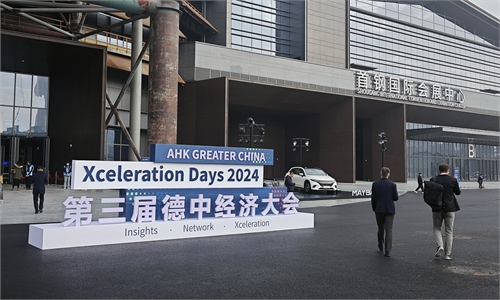
Visitors view an electric vehicle of BYD from China during the Festival of Motoring in Johannesburg, South Africa, Aug. 30, 2024. This event is held here from Aug. 30 to Sept. 1. Photo: Xinhua
Despite the EU's recent implementation of imposing high tariffs on Chinese electric vehicles (EVs), negotiations for alternative solutions continue, and both sides have shown an intention to manage their differences and avoid further escalation in trade tensions.
The EU does not want a trade war with China. It will push ahead with talks with China until the two sides "find a mutually agreeable solution," EU Ambassador to China Jorge Toledo said recently at an event in Shanghai, according to reports by Reuters and the South China Morning Post.
China has shown great sincerity from the very beginning. It is committed to multilateralism and hopes to resolve the issue through bilateral talks rather than taking a unilateral approach.
On the EU's side, it has shown a willingness to explore alternative solutions, indicating that both sides want to manage their differences.
From China's perspective, there is a clear desire to prevent a growing or more intense trade conflict with the EU, as this would disrupt the normal development of bilateral economic ties. For the EU, a heated trade dispute with China would severely harm its economic recovery, amid geopolitical uncertainties.
Within the EU, there is no unified stance on the issue. Germany and France, for instance, hold opposing views, and some other countries that have no direct stakes in the automotive sector with China, wouldn't want this issue to disrupt their trade and economic relations with China.
The European Commission's imposing high tariffs on Chinese EVs is a mistake, the Brussels-based economic think tank Bruegel said on October 8.
The duties will harm EU citizens more than help them, and they will eventually backfire on the European automotive industry, Bruegel said in a report.
Europe's leading automakers aren't in favor of this development either. Cooperation between the two parties is always better for both economies than erecting trade barriers which hurt both.
As a matter of fact, Chinese EVs derive their advantages from a highly integrated supply chain, strong industry clustering, fierce market competition and rapid technological progress fueled by a vast domestic market in the country.
Chinese new-energy vehicles not only offer global consumers a wider range of options but also support more countries in the transition to green and sustainable economic development.
If, unfortunately, the two sides fail to reach an agreement in the end, there may be some short-term impact on Chinese EV makers. But in the long run, the negative effects are controllable.
What's more concerning is the potential strain it could put on bilateral trade relations. This kind of unilateral trade protectionism undermines mutual trust in economic ties between Europe and China, and it could even lead to more frictions in their trade relations.
China will certainly take corresponding measures to protect the legitimate rights and interests of its companies, including actions already taken, such as filing a complaint with the World Trade Organization (WTO).
The EU's levying tariffs, lacking factual and legal basis while violating WTO rules, is an abuse of trade remedy measures and a practice of trade protectionism in the name of countervailing tariffs, a spokesperson for China's Commerce Ministry said on Monday.
Now the negotiations continue, reflecting a mutual willingness to avoid further escalation in their trade tensions. It is hoped that the EU could return to a multilateral framework and approach similar issues with a win-win mindset, rather than pursue a path that leads to lose-lose.
At the same time, Chinese companies need not truly step away from the European market, while their primary focus should be on enhancing their own technological competitiveness, which is essential to maintaining a strong position and defuse others' protectionist moves.
The author is deputy director of the Center for China-Europe Relations at Fudan University's Institute of International Studies. bizopinion@globaltimes.com.cn



